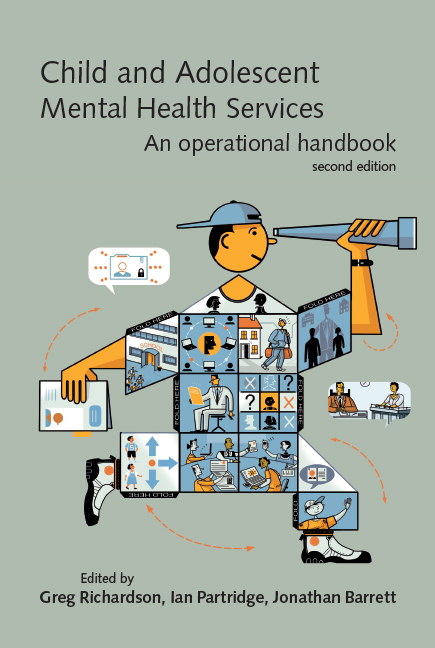Book contents
- Frontmatter
- Contents
- Tables, boxes and figures
- Contributors
- Abbreviations
- Preface
- 1 Introduction
- 2 CAMHS in context
- 3 CAMHS and the law
- 4 Structure, organisation and management of CAMHS
- 5 Evidence-based practice
- 6 Clinical governance
- 7 Education, supervision and workforce development
- 8 Multidisciplinary working
- 9 User and carer participation and advocacy
- 10 A comprehensive CAMHS
- 11 Referral management
- 12 Demand and capacity management
- 13 Strategies for working with Tier 1
- 14 Structuring and managing treatment options
- 15 CAMHS in the emergency department
- 16 Paediatric liaison
- 17 Self-harm
- 18 Learning disability services
- 19 Services for autism-spectrum disorders
- 20 Attentional problems services
- 21 Eating disorder teams
- 22 Bereavement services
- 23 CAMHS for refugees and recent immigrants
- 24 CAMHS and looked-after children
- 25 Drug and alcohol teams
- 26 Parenting risk assessment service
- 27 Court work
- 28 Tier 4 options
- 29 In-patient psychiatric care
- 30 Forensic services
- 31 Neuropsychiatry and neuropsychology services
- 32 Mental health provision for deaf children: study of a low-incidence service provision
- 33 Chief Executives – what do they want and how do they get it?
- Index
5 - Evidence-based practice
- Frontmatter
- Contents
- Tables, boxes and figures
- Contributors
- Abbreviations
- Preface
- 1 Introduction
- 2 CAMHS in context
- 3 CAMHS and the law
- 4 Structure, organisation and management of CAMHS
- 5 Evidence-based practice
- 6 Clinical governance
- 7 Education, supervision and workforce development
- 8 Multidisciplinary working
- 9 User and carer participation and advocacy
- 10 A comprehensive CAMHS
- 11 Referral management
- 12 Demand and capacity management
- 13 Strategies for working with Tier 1
- 14 Structuring and managing treatment options
- 15 CAMHS in the emergency department
- 16 Paediatric liaison
- 17 Self-harm
- 18 Learning disability services
- 19 Services for autism-spectrum disorders
- 20 Attentional problems services
- 21 Eating disorder teams
- 22 Bereavement services
- 23 CAMHS for refugees and recent immigrants
- 24 CAMHS and looked-after children
- 25 Drug and alcohol teams
- 26 Parenting risk assessment service
- 27 Court work
- 28 Tier 4 options
- 29 In-patient psychiatric care
- 30 Forensic services
- 31 Neuropsychiatry and neuropsychology services
- 32 Mental health provision for deaf children: study of a low-incidence service provision
- 33 Chief Executives – what do they want and how do they get it?
- Index
Summary
‘The good educationalist works from within the material drawing it out, he does not impose the pattern he has chosen on “ungrateful material”.’
Cornelius CardewIntroduction
Evidence-based practice in CAMHS is epitomised by the conscientious, explicit and judicious use of current best evidence in decision-making about the care of young people and families (Sackett et al, 1997). Evidence-based practice therefore strives to:
• improve decision-making
• encourage cost-effective use of limited resources
• enhance knowledge among CAMHS practitioners
• assist in communication with families and facilitate collaborative, informed decision-making.
The underlying philosophy of evidence-based practice is that therapeutic interventions should be rational, measurable and observed to benefit their recipient (Laugharne, 1999). This leads to an attempt to standardise the way that all healthcare workers make clinical decisions, with a strong emphasis on using the best evidence available from research.
‘The aim is to see that Research and Development becomes an integral part of healthcare, so that managers and practitioners find it natural to rely on the results of research in their day to day decision making. … Strongly held views, based on belief rather than sound information, still exert too much influence in healthcare. In some instances knowledge is available but is not being used, in other situations additional knowledge needs to be generated from reliable sources.’
(Peckham, 1991)In this statement the government set an agenda that obliges all healthcare professionals to use evidence-based approaches to their clinical decision-making. A First Class Service (Department of Health, 1998) specifies that a quality organisation will ensure that evidence-based practice is in day-to-day use, with the infrastructure to support it. Evidence-based practice has been driven by the need for accountability to commissioners, families and those funding services. Standards for Better Health (Department of Health, 2006) states that healthcare organisations ensure that they conform to NICE technology appraisals and, where it is available, take into account nationally agreed guidance when planning and delivering treatment and care. Inertia can be induced when practitioners are required to work differently, which might present a barrier to the implementation of evidence-based practice. There are attendant risks of evidence-based nihilism, if professionals seek ‘perfect’ rather than the best-available evidence (Ramchandani et al, 2001). Research is provisional by nature, and will only provide definitive answers to specific populations.
- Type
- Chapter
- Information
- Child and Adolescent Mental Health ServicesAn Operational Handbook, pp. 39 - 50Publisher: Royal College of PsychiatristsFirst published in: 2017



